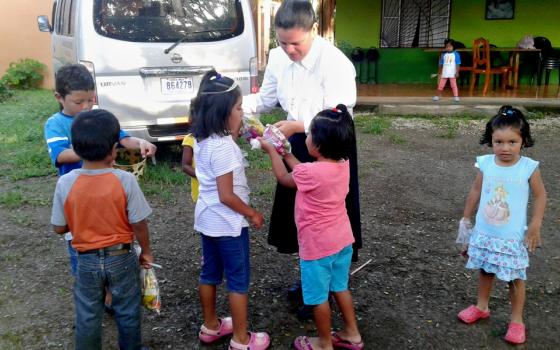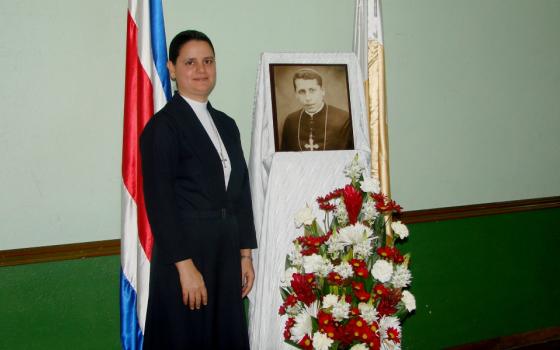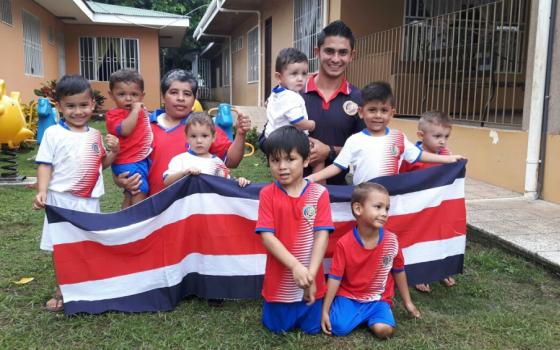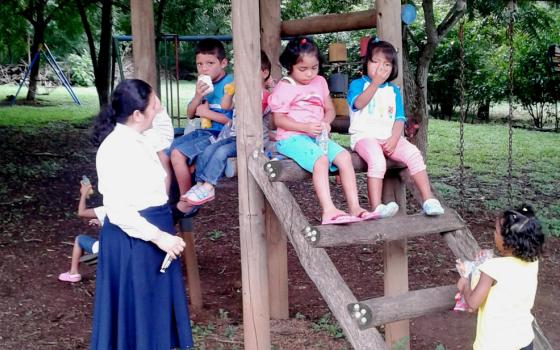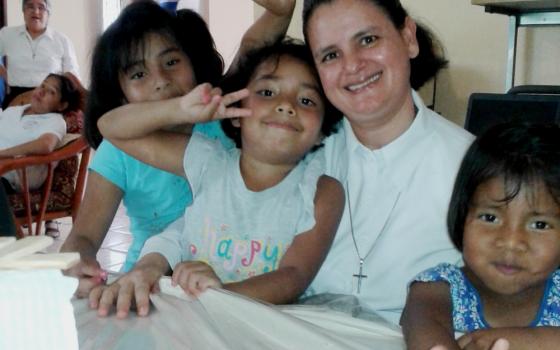Sr. María Molina has noticed a disturbing trend in recent years among the neglected and abandoned children arriving at the two homes run by the Congregation of the Missionary Sisters of the Assumption in Costa Rica. There are more very young babies, some just days old, being transferred to the homes directly from hospitals by the national child welfare agency.
"They're children of young or adolescent mothers, addicted to drugs," she explained. She added that the mothers are "street addicts, so the hospital doesn't give them the child" but transfers those babies to the Patronato Nacional de la Infancia (National Children's Welfare Agency, or PANI), which in turn resorts to the sisters.
She said no babies have been turned away because of lack of space or resources.
By helping to save the lives of children abandoned, abused or neglected in Costa Rica, the congregation is also continuing the social welfare legacy of its founder, Archbishop Víctor Manuel Sanabria of San José, who died in 1952.
The sisters run two homes that care for 130 children. The largest, with 85 children, from infants to teenagers, is in the coastal city of Puntarenas, some 115 kilometers (72 miles) west of the nation's capital of San José. The other is in Cartago, about 23 kilometers from the capital.
The Hogares de Niños (Children's Homes) are the primary focus of the social work of the 53 sisters in the congregation, said Molina, community coordinator. The sisters also assist families living in poverty, focusing on the northwestern province of Guanacaste, bordering Nicaragua, one of the poorest areas in Costa Rica. They teach adults who lack elementary education or haven't finished school. The sisters prioritize aiding women, providing courses in cooking and sewing.
The congregation was founded in 1950 by Sanabria, archbishop of San José from 1940 to 1952. He is credited with deep involvement and a key role in the unprecedented social reform of the 1940s in this peaceful Central American nation, including promoting workers' rights and the creation of the Costa Rican union movement. He also founded the local, and still broadcasting, Catholic radio station Radio Fides (Radio Faith). Earlier this year, the Episcopal Conference of Costa Rica inquired at the Vatican about the steps to be followed to promote Sanabria's beatification cause.
By creating the congregation, Molina explained, Sanabria aimed to strengthen evangelization by including a strong social component. "That's how the first five sisters, who were teachers, started," she said, referring to the women Sanabria selected to launch the congregation.
She explained that Sanabria "brought them together, sent them on several missions, gave them a one-year trial period, asked them to find a house where they could lead a common life and start a congregation, which at the time is called Pía Unión [Pious Union], because it's like the first experience in living as a community."
Following Sanabria's initiative, they did not wear a habit, but dressed in a simpler uniform, which they still use, she said.
They began to work at a school in a home for more than 100 abandoned girls in the Pacific port city of Puntarenas, which was then an environment for child prostitution, said Molina.
The home and the school had been started by a priest 99 years ago in Puntarenas. Both were almost immediately turned over to the Congregación de Hermanas del Buen Pastor (Congregation of Sisters of the Good Shepherd), who transferred it to the present congregation 70 years ago.
Molina joined the order in 1987, in San Carlos, her hometown — also known as Ciudad Quesada — in northern Costa Rica, some 80 kilometers northwest of San José, when members of the order arrived to do missionary work.
"They went there for mission work with youngsters," and "I loved their mission," she recalled.
She was later sent to the Dominican Republic, where she stayed for nine years. "There, we did a very beautiful mission in zones with much poverty, with very nice social projects," Molina said. She returned to Costa Rica in 2012.
After the Congregation of the Missionary Sisters of the Assumption took over the work at Puntarenas, new installations were built, replacing the old wooden structure of the home. The school was eventually closed down — the girls study at a public school.
Now, the sisters work in all of Costa Rica's seven provinces, though most care for the children at the two homes.
The home in Puntarenas is actually a five-house complex, supported by the government with infrastructure and food, Molina said. Until recent years, mothers unable to care for their children would arrive at the homes and hand the minors over to the sisters, but changes in legislation now require abandoned children to be registered by the Patronato Nacional de la Infancia before being entrusted to the congregation.
At the home in Cartago over the past several months, babies as young as eight days have been taken in after the children's welfare agency has transferred them directly from hospitals.
The particular circumstances of one baby being brought to the sisters on Christmas Eve 17 years ago still stays with Molina. At the home in Puntarenas, a woman with a baby about 6 months old rang the bell.
"She told me, 'I can't look after her, and she's starving, and I want to leave her here.' And I felt like an impact, because it was Christmas. And she says: 'And if you don't take her in, I'll just abandon her.' Holy God! Of course I'll take her in!"
The mother, she suspected, was addicted to drugs. The baby, she suspected, also had some drugs in her system. "She spent like four days reacting to nothing, no crying; one knew she was alive only because she was breathing," Molina said. "But as we cared for her, she became so pretty. It's the kind of experience when you say: 'My God!' But that's what the institution is for."
Molina added that the girl remains close to the sisters, so "we monitor her."
The children at the homes receive professional psychological — often psychiatric — support, she said. Despite the challenges they face, they are motivated to study, she said.
Most of the children come from dysfunctional families in different parts of Costa Rica, mainly communities where common and organized crime have introduced drugs — and the resulting violence. The children's parents are often addicted to drugs, and virtually all the children — especially the girls — are victims of abuse.
"They sell them, prostitute them," Molina said. "The experiences are too powerful, they're many and too powerful, one never imagines."
"It's an extremely hard experience, to work with them, mainly when they're girls, from 8 to 12 years old, because they're big girls who perfectly understand the situation, they can't solve it, it's not in their hands to do anything, and they're being trampled by a situation," she said.
When hearing such tragic stories, "one has to be very firm and very balanced," so as not to become overwhelmed, she said. "You must have a strong heart, because they easily tell a story that one never imagines — and yet it happens."
An unwavering faith is also essential, she said.
"Starting from the experience that we're consecrated to God, by faith, we make a life project by trying to follow Christ," she said. "It's fundamental, that starting from there I understand that I can serve others. It can't be done any other way."
To serve children with such great needs, "we try a lot to strengthen our personal relationship with Christ, and draw strength from there."
[George Rodriguez, a freelance correspondent based in Costa Rica, has reported for Reuters and other international news agencies.]
